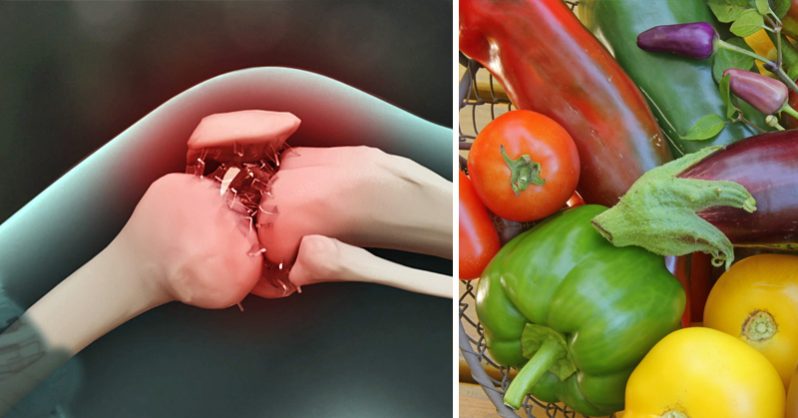Nightshades are a specific group of plants, which belongs to the Solanaceae family and involves more than 2,000 species, such as potatoes, tomatoes, eggplants, and all pepper types.
Blueberries, goji berries, huckleberries, and ashwagandha (Indian Ginseng) are not real members of the group of nightshades, but they contain the same inflammation-inducing alkaloids.
Apparently, these plants lead to inflammation due to a specific chemical called solanine, believed to cause irritations of the gastrointestinal tract. As soon as it is absorbed into the bloodstream, it destroys the oxygen-carrying red blood cells.
Solanine is an acetylcholinesterase inhibitor, as it prevents the breakdown of this neurotransmitter, and causes its excessive accumulation in nerve receptor sites.
This constantly over-stimulates the Ach receptors, especially within the nervous system, by stimulating the parasympathetic nervous system. Yet, these chemicals are not broken down in the body, nor water soluble, so they must leave the body as alpha-solanine, a neurotoxin.
The consumption of nightshades can lead to aggravated arthritis symptoms, and some researchers even believe that this condition is often misdiagnosed in people who actually have a nightshade sensitivity.
Namely, alkaloids affect the calcium metabolism, eliminating it from the bones, so it is accumulated in the soft tissue, leading to arthritis. Therefore, researchers advise patients with osteoarthritis, rheumatoid arthritis or other joint problems to avoid nightshade foods.
As Norman F. Childers, Ph.D., the founder of the Arthritis Nightshades Research Foundation, explains:
“Diet appears to be a factor in the etiology of arthritis based on surveys of over 1400 volunteers during a 20-year period. Plants in the drug family, Solanaceae (nightshades) are an important causative factor in arthritis in sensitive people.”
Many people are sensitive to an alkaloid called tropane, which is the primary cause of such reactions.
Furthermore, the elimination of these plants from the diet provides beneficial effects in the case of reactive airways disease, leg weakness, knee pain, and arthritis-related diseases like lupus, rheumatism, and other musculoskeletal pain disorders.
Therefore, if you are one of these people, avoid the following:
- Tomatoes (all varieties)
- Peppers (all varieties, like paprika, cayenne, bell pepper, wax pepper, green & red peppers, chili peppers, etc)
- Eggplant (aubergine)
- Goji berries
- Tomatillos (a Peruvian plum-like fruit)
- Artichokes
- Potatoes (all varieties, except for sweet potatoes or yams)
- Okra
- Sorrel
- Gooseberries
- Cayenne Pepper
- Tobacco
- Paprika
- Garden Huckleberry & Blueberries
- Pepino Melon
- The Homeopathic “Belladonna”
- Soy sauce(GMO soybeans are cut from the nightshade plant Petunia)
Additionally, avoid the following products:
- Edible flowers: Petunia, chalice vine, day jasmine, angel and devil’s trumpets
- Vodka( its production involved potatoes)
- Homeopathic remedies that contain Belladonna
- Many baking powders contain potato starch
- Prescription and over-the-counter medications containing potato starch as a filler, like sleeping pills, and muscle relaxing medications
- Atropine and Scopolamine, used in sleeping pills
- Topical pain and inflammation remedies that contain capsicum
- Adhesives on many envelops contain potato starch, so do not lick them
Three Month Challenge
To check if nightshades have a negative influence on your health, you should take the three-month challenge, and avoid them for that time.
Note down all symptoms you experience, like headaches, energy loss, respiratory issues, stiffness, etc. After 3 months, reintroduce them, one at a time.
Sources:
myhealthmaven.com
